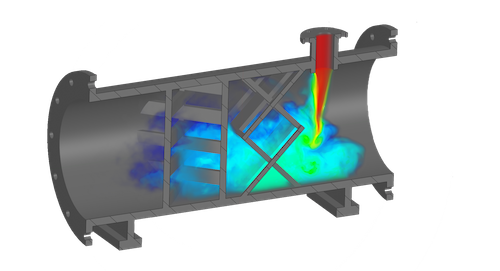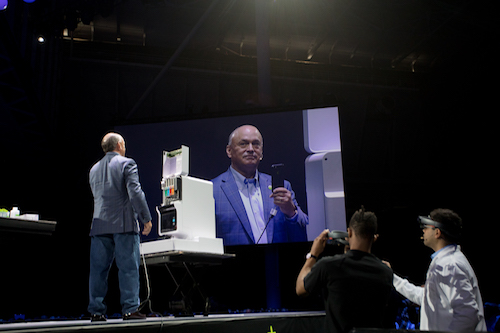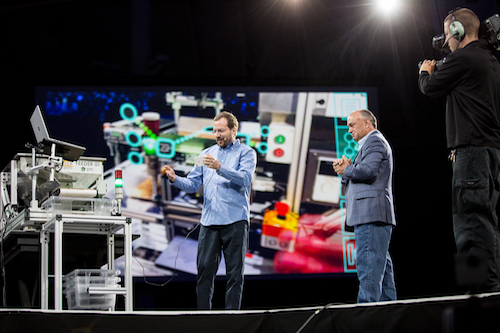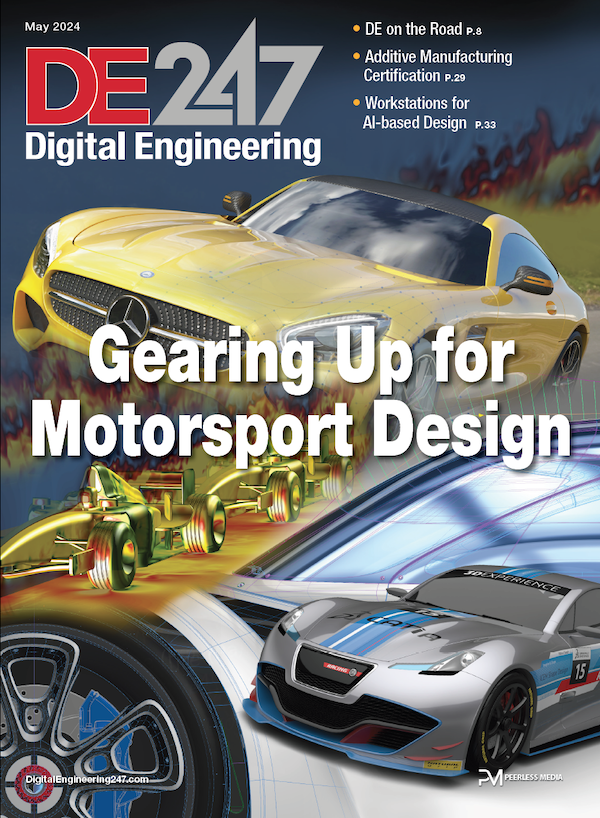
PTC’s Jim Heppelmann showcases how PTC is evolving its Vuforia augmented reality suite to support innovative maintenance and training applications. Image Courtesy of PTC
Latest News
June 20, 2018
Partners and the pace of innovation—those were the primary talking points at this week’s LiveWorx 2018 keynote as PTC President and CEO Jim Heppelmann unveiled new industry collaborators along with capabilities in areas from simulation to smart manufacturing designed to advance what Heppelmann called the “new frontier of innovation.”
Heppelmann, who’s been steadily and aggressively steering PTC beyond its 3D design software roots to cutting-edge areas like the Internet of Things (IoT) and augmented reality, said the company is moving fast to enact change in the physical and digital worlds as well as in how humans interact with digital and physical things. PTC is moving its global headquarters to Boston’s Seaport, considered the city’s innovation hub, and as part of its journey, Heppelmann is now touting the PTC acronym not as the original Parametric Technology Corp., but rather as Prepare to Change. That was underlying theme of Heppelmann’s LiveWorx keynote address, driven home by the usual fanfare of human performance artists and a digital laser show.
“Inertia is the main competitor because it’s the enemy of change,” he told the audience. “The world is changing in ways we didn’t anticipate—PTC is ready and willing to make changes happen at a blistering pace.”
In that spirit, Heppelmann made a series of announcements designed to advance PTC’s transformation. On the physical front, he touted fresh capabilities in the newly released Creo 5.0 in areas like additive manufacturing, topology optimization, and simulation. The Creo Topology Optimization Extension, built into the software, automatically creates optimized designs based on a defined set of constraints and parameters. The tool is not only directly accessible in Creo, it automatically creates B-rep geometry from the topology, which can be then be further modified parametrically, streamlining the overall workflow. “No more wasting time to recreate the geometry to match the optimized geometry in an external tool,” Heppelmann explains.
 ANSYS and PTC have forged a strategic partnership to embed ANSYS Discovery Live real-time simulation platform into Creo and other future products. Image Courtesy of ANSYS
ANSYS and PTC have forged a strategic partnership to embed ANSYS Discovery Live real-time simulation platform into Creo and other future products. Image Courtesy of ANSYSPTC also took a step to make simulation a continuous process throughout design via a new partnership with ANSYS. The pair announced they are working together to integrate ANSYS Discovery Live, a real-time simulation capability, directly into Creo. The resulting Creo Simulation Live unified modeling and simulation solution will allow engineers to instantaneously leverage static, structural, thermal, and modal analysis throughout each stage of the design process and with every iteration.
“Eighty percent of product cost is locked in in early design,” explains Ajei Gopal, ANSYS CEO. “With real-time simulation, you get the cost and time savings of illuminating problems early in the process so you can solve design challenges without risking product delay or setback.”
Partnerships were a big part of Heppelmann’s message, particularly in the AR and industrial IoT areas. For example, a partnership with Microsoft is tasked with creating synergies between PTC’s IoT and AR product line and Microsoft Azure IoT cloud, Hololens AR glasses, and Dynamics industrial application for such use cases as design reviews and smart factory applications like performance monitoring of industrial assets and predictive maintenance. “We’re working on how to democratize IoT and AI, and mixed reality is essential to this,” says Rodney Clark, Microsoft’s vice president of IoT and mixed reality.
 PTC’s Jim Heppelmann showcases how PTC is evolving its Vuforia augmented reality suite to support innovative maintenance and training applications. Image Courtesy of PTC.
PTC’s Jim Heppelmann showcases how PTC is evolving its Vuforia augmented reality suite to support innovative maintenance and training applications. Image Courtesy of PTC.PTC also showcased an early demonstration capability based on its recent acquisition of WayPoint, a startup coming out of MIT and Harvard that is working on using AR to change the way humans—in this case, front-line workers—leverage digital information on the job. The WayPoint Desktop Editor, for example, provides a new way of capturing work instructions, and the Reality Editor, now under development in PTC’s Reality Lab, is tapping AR to create a visual programming means of building future machine interfaces and control systems.
 Through its acquisition of Waypoint, PTC is exploring how to actively program the logic of control systems using augmented reality. Image Courtesy of PTC.
Through its acquisition of Waypoint, PTC is exploring how to actively program the logic of control systems using augmented reality. Image Courtesy of PTC.In fact, Heppelmann said PTC is having a “surprising amount of success” enabling customers to transform and win in the factory. To that end, the company announced a major strategic partnership with Rockwell Automation through which the automation giant will make a $1 billion equity investment in PTC and its Chairman and CEO Blake Moret joins the PTC board. The partnership calls for two to collaborate on technical solutions and joint go-to-market initiatives around their respective ThingWorx IoT, Kepware, Vuforia, and FactoryTalk MES and Analytics platforms.
Says Heppelmann: “We’re on a high-speed excursion, and partnerships are key to us moving fast.”
Watch this video to get a sneak peak at Creo Simulation Live, powered by ANSYS.
Subscribe to our FREE magazine, FREE email newsletters or both!
Latest News
About the Author
Beth Stackpole is a contributing editor to Digital Engineering. Send e-mail about this article to [email protected].
Follow DE





